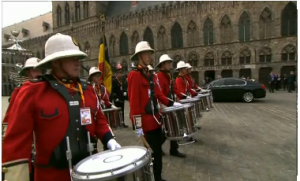
(Reuters) — European Union leaders commemorated the 100th anniversary of World War One at a solemn ceremony in Belgium on Thursday (June 26) in a show of unity that briefly masked deep disagreement over who should head their most influential institution.
At Menin Gate, a memorial to 50,000 British and Commonwealth soldiers killed in the battle ofYpres, German Chancellor Angela Merkel stood alongside British Prime Minister David Cameron, French President Francois Hollande and other leaders to honour the fallen of what became known as the Great War.
They stood together as eight Belgian buglers sounded the Last Post in a symbol of reconciliation among former enemies that barely masked Cameron’s isolation among his fellow leaders.
The haunting music has been played daily at the Gate since 1928, with the exception of the World War Two years of Nazi German occupation.
European Council President Herman Van Rompuy recalled how “this continent of civilised nations” marched mindlessly to the abyss in 1914, “sleepwalking” into a war that killed millions.
Europe’s “collective folly” had ended only after World War Two concluded 1945, or indeed in 1989 with the fall of the Berlin Wall and the end of the Cold War, he said.
EU officials were at pains to ensure the ceremony was not totally overshadowed by a fierce political battle over the leadership of the European Commission, a decision due to be taken when the summit moves to Brussels on Friday.
But the smouldering row over whether former Luxembourg prime minister Jean-Claude Junckershould lead the EU’s executive for the next five years hung over Thursday’s events, even if it was kept off the dinner table at which leaders were due to debate a ‘strategic agenda’ for the bloc until 2019.







